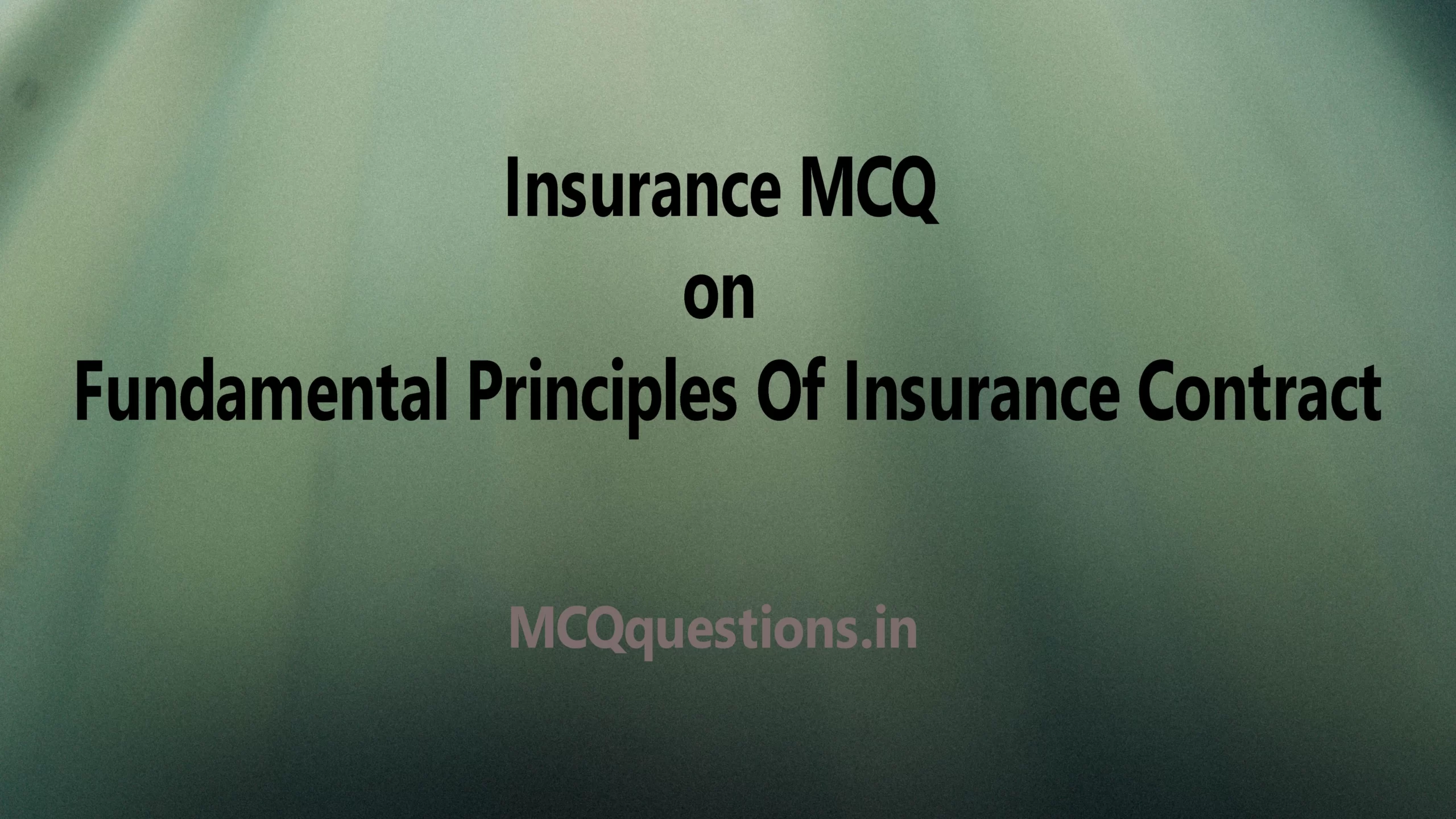
You can also read: Accounting MCQ questions with answers [Class 12th]
Insurance MCQ on Fundamental Principles Of Insurance Contract
1. Methods of indemnity are :
(i) Cash payment
(ii) Repairs
(iii) Replacement
(iv) All of the above
ANS. (iv) All of the above
2. Principle of indemnity is not applicableto:
(i) Fire Insurance
(ii) Marine Insurance
(iii) Life Insurance
(iv ) Motor Insurance
ANS. (iii) Life Insurance
3. Which is not the general principle of insurance :
(i) Offer and Acceptance
(ii) Lawful consideration
(iii) Principle of Subrogation
(iv) Free Concent
ANS. (iii) Principle of Subrogation
4. The principle of insurable interest is:
(i) General Principle
(ii) Fundamental Principle
(iii) Miscellaneous principle
(iv) Ordinary Principle
ANS. (ii) Fundamental Principle
5. Which is not the fundamental principle of insurance?
(i) Utmost Good Faith
(ii) Indemnity
(iii) Capacity of parties
(iv) Proximate Cause
ANS. (iii) Capacity of parties
6. Parties competent to make contract of insurance includes:
(i) Who is of the age of majority
(ii) Who is of sound mind
(iii) Who is not disqualified
(iv) All of theabove
ANS. (iv) All of the above
7. U/s 14 of Indian Contract Act, the consent for insurance contract is free when it is not caused by: :
(i) Coercion
(ii)Undue Influence
(iii) Fraud
(iv) All of the above
ANS. (iv) All of the above
8. The object of Insurance contract is not lawful when:
(i) It is not forbidden by law
(ii) It is Immoral
(iii) It is not opposed to public policy
(iv) It is not against the provisions of any law
ANS. (ii) It is Immoral
9. Which is not the essential of insurable interest:
(i) Specific subject matter
(ii) Non-monetary benefit
(iii) Legal relationship with subject matter
(iv) Insured must have legal right in subject matter
ANS. (iv) Insured must have legal right in subject matter
10. A contract between two or more insurance companies by which a part of risk of loss is shifted to another insurer is :
(i) Insurance
(ii) Reinsurance
(iii) Co-insurance
(iv) None of the above
ANS.(ii) Reinsurance
11. The splitting or spreading of risk among multiple parties is:
(i) Insurance
(ii) Double-insurance
(iii) Re-insurance
(iv) Co-insurance
ANS. (iv) Co-insurance
12. Which is the oldest method of re-insurance:
(i)Facultative Method
(ii) Treaty Method
(iii) Polling Method
(iv) None of the above
ANS. (i)Facultative Method
13. which of the following is a primary function of Insurance?
(i) Risk Sharing
(ii) Improves Efficiency
(iii) Provides Capital
(iv) None of the above
ANS. (i) Risk Sharing
14. which method of Re-insurance covers larger risks?
(i)Facultative Method
(ii) Treaty Method
(iii) Polling Method
(iv) None of the above
ANS. (iii) Polling Method
15. Insurance Act,1938 applies to:
(i) Life Insurance
(ii) Fire Insurance
(iii) Marine Insurance
(iv) All of the above
ANS. (iv) All of the above
16. Section 2(13)A of the Insurance Act,1938 deals with:
(i) Motor Insurance
(ii) Marine Insurance
(iii) Health Insurance
(iv) All of the above
ANS. (ii) Marine Insurance
17. Section 2(6)A of the Insurance Act,1938 deals with:
(i) Motor Insurance
(ii) Marine Insurance
(iii) Health Insurance
(iv) Fire Insurance
ANS. (iv) Fire Insurance
18. Organisation carrying on business of Insurance in India is:
(i) Public Companies
(ii) Registered Co-operative Societies
(iii) Company registered under any foreign act
(iv) All of the above
ANS. (iv) All of the above
19. Section 42 of the Insurance Act,1938 deals with:
(i) Motor Insurance
(ii) Marine Insurance
(iii) Licensing of Insurance Agents
(iv) Fire Insurance
ANS. (iii) Licensing of Insurance Agents
20. Section 2(II) of the Insurance Act,1938 deals with:
(i) Life Insurance
(ii) Marine Insurance
(iii) Motor Insurance
(iv) Fire insurance
ANS. (i) Life Insurance